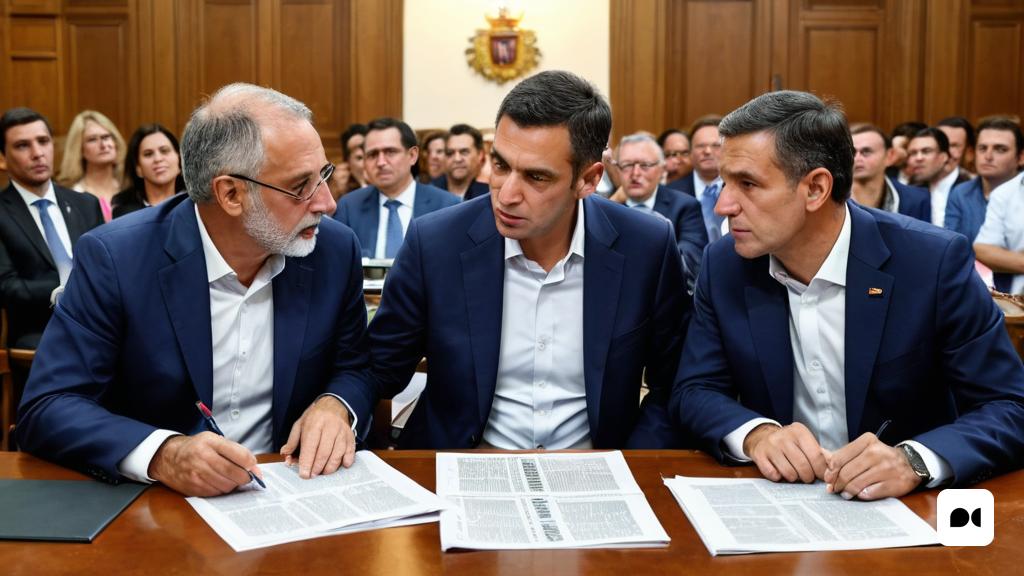An unusual moment in the press
It is not common for a single image to capture the attention of all the covers of the most relevant media in Catalonia and Madrid, unless it is an issue of great political or international magnitude. However, on July 25, photographs of the meeting that took place the previous day between Pedro Sánchez, the president of the Spanish Government, and Pere Aragonès, the acting president of the Generalitat, were selected to adorn almost all the newspapers. Although not all outlets used the same image, each reflected an editorial intent that aligns with the focus of its headline. This staging of the meeting, where Sánchez attended the Palau de la Generalitat with Aragonès as host, was mostly limited to images, given that the protagonists opted for silence, which in Madrid could be described as ‘exiting the forum’.
The dynamics of agreements
For some media outlets, such as El País and La Vanguardia, the main purpose of the meeting was to validate investiture commitments that still remain unfulfilled, including the transfer of the management of the Minimum Living Income. According to these newspapers, the meeting ‘accelerates negotiations’ between the Spanish Socialist Workers Party, the Party of Socialists of Catalonia and Esquerra Republicana de Catalunya, in relation to the future investiture of Salvador Illa. In other words, you could say that the situation is ‘flattening’. In the image used by El País, the difference in perceptions generated by the height discrepancy between the two presidents (1.90 versus 1.63) is evident, where Sánchez is forced to look at Aragonès from above while offering his hand, contrasting with the image of La Vanguardia, which presents a more institutional perspective in which both leaders talk seated, thus disguising their physical difference.
Conservative media focus
On the other hand, the three Madrid newspapers considered the most conservative, which are often associated with the Popular Party, have chosen to highlight the same meeting, although placing emphasis on the tension between Junts and the PSOE, as well as the instability that could affect the legislature. due to votes against the Government’s proposals related to the deficit. These newspapers have highlighted that one of the great difficulties for next year’s budgets comes from the recent vote on the reform of the immigration law, which was rejected by the independentistas. In this context, ABC has emphasized the pessimism that seems to reign in the PSOE, stating that ‘not even Illa can save the legislature’, a statement that is presented as the voice of ‘an important figure within the party’, whose identity is not revealed. , and who also expresses that he is ‘in the worst moment, without a doubt’, in relations between Junts and the socialists.
The image of confrontation
El Mundo and La Razón have curiously opted for the same illustration, where Pedro Sánchez practically hides Pere Aragonès, emphasizing the existing crisis between Junts and the PSOE. Both media agree that the independentistas have warned that they ‘would not support’ the candidate if their intention is to make Salvador Illa the new president. Furthermore, they report that Carles Puigdemont has indicated to Sánchez that he will continue ‘dealing blows’, a phrase attributed to the leader of Junts, which alludes to the statement of Minister Ernest Urtasun, who characterized the frustrated votes as ‘a blow’ to the Spanish Government, as It was mentioned in a conversation with deputy Francesc-Marc Álvaro, recorded by an open microphone.
The controversial resolution of the Supreme Court
An additional aspect that stands out on recent front pages is the decision of the Supreme Court, which has urged the Constitutional Court to annul the amnesty law, considering that it ‘favors the coup plotters’, an issue that La Vanguardia exposes in its main headline. This resolution is based on the belief that the new legislation infringes the principle of equality. This arises from an appeal filed by a person convicted of serious public disorder crimes related to incidents that occurred in Girona in October 2019, after the publication of the Supreme Court’s ruling on the trial, where objects were thrown at a courthouse. Most significantly, the Supreme Court considers that the amnesty law benefits ‘the coup plotters’ who have challenged the institutions ‘against the democrats’, recalling that they were described as ‘cowardly’ and ‘botiflers’.
Reaction of the most critical press
La Razón has also chosen this issue as its featured headline, highlighting the Supreme Court’s opinion that the law is ‘repugnant’ to the right to equality before the law, warning that ‘the democratic system’ is at stake. In this way, media attention focuses not only on the meeting between political leaders, but also on the effect that these judicial decisions could have on the political board at a time of great uncertainty for the future of relations between different political forces. in Spain.

